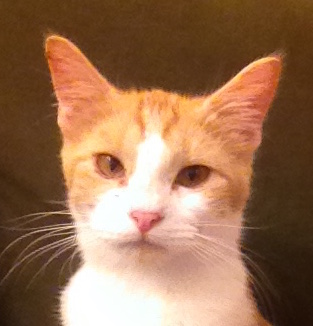You hear a noise in the night.
You toss back the sheets and swing your legs over the bed’s edge. You creep out into the dark. Your husband doesn’t seem to hear—not surprising. He doesn’t hear anything when he’s asleep, not the baby crying or the sink dripping water or the muffled sounds you sometimes hear when you’re lying awake in bed. Crying—that’s what it sounds like.
The moon lights your way. It peeks in at you through the parallel windows near the door. You’ve always loved the moon, the night. You love the soft pallet of cool colors, the blues and purples and blacks created by the darkness.
There’s a painting on the wall near the basement door: an image of a house in the woods at night. It’s your house, the one you’re in now. It might be the best painting you’ve ever done.
You peer at your painting, your house, and you notice something that you hadn’t before. There’s a person in the frame. A man standing under the eave of the roof, his face obscured by shadow.
Odd. You don’t remember painting that.
The man turns to stare at you. You admire the way his face is shaded, the perspective of his hand as it reaches out. He looks quite lifelike. You’ve always struggled with the human form—whoever did this man did a fantastic job.
Of course, you’re dreaming. You must be. Paintings only move in dreams.
Yes, you must be dreaming, because the man reaches through the frame, and he touches you. His fingers are moist slugs against your skin.
You scream, and when you do, your husband asks you to stop screaming, he’s trying to sleep.
Your eyes snap open. Here you are, back in bed next to your husband. Turns out he does wake up—you just have to shriek really loudly. He reiterates the fact that he’s trying to sleep. And then he rolls over.
You lie awake. You stare at the white ceiling. You promise yourself that it was just a dream. Paintings don’t move in real life, after all.
Then why are there paint smudges on your arm, right where the man from your dream touched you?
#
Hours pass, and you’re still staring at the ceiling. The white ceiling. You remember choosing that shade of white for the master bedroom, though you can’t remember the name. Something like a fairy tale, maybe?
You hear the baby crying in the other room. You’re not surprised. You’re also not surprised that your husband is still snoring loudly beside you, oblivious. Of course, of course.
You walk into the baby’s room, just one door down from yours. You pick her up and hold her and she stops crying immediately. You’re thankful for that—for a pair of nascent lungs, hers are powerful.
You take her downstairs and you feed her. And finally, an hour or so later, your husband wakes up and joins you. He asks you how you slept. That’s when you remember your strange dream.
You tell him about it. He listens to you. He says it probably means you have repressed rage or something, then heads upstairs to get dressed for work.
On a whim, you glance at your painting, the one near the basement door. It looks just the way you remember it looking—dark shading, smoke rising from the chimney, silver moon peering over an intricate tree line.
But no man. No hand reaching out of the frame.
It makes you feel a bit silly for thinking, even for a moment, that your dream might’ve been real. You’ve had nightmares before, many of them, but you’ve never had one quite so vivid as last night’s. Like dreaming in living color, some might say.
Frightening, certainly. But not real.
The baby is crying again. Your husband shouts this down to you from upstairs, as if you hadn’t noticed.
You wash your hands. And when you hold them under the hot, steaming water, something drips off into the basin. It looks like paint. But you haven’t been painting.
It’s strange and a little disconcerting that the paint washing off your hands, the paint you don’t remember painting with, is the same color as your skin.
#
You go through the day without looking at your painting. You avoid it the way you might avoid making eye contact with someone you have a history with. Still, you feel a gaze on your back, as though it’s looking at you. You can’t explain why you feel this way.
Your husband goes off to work. You don’t see him again for the rest of the day and most of the night. When he comes home, finally, he smells strange. Almost like paint.
The baby cries and cries all day, and she won’t stop unless you hold her. You just want the poor kid to be happy, for once.
Some time that night, you finally dare to look at the painting of your house. Again, there’s something there you don’t remember adding. Through the window in the lower half of the house, you have a clear view of the basement door and the wall beside it.
That wall should be blank—you did not paint anything on it—but now there’s a picture there. You look at the picture, you get as close as you can. It’s so small. You can’t be sure, but it almost looks like the painting within your painting is a painting of a house.
You drag your husband over to it and you ask him if he notices anything different about it. He looks at it for about a second, says he likes it, then pulls out his phone. You tell him to put his god damn phone away and look at it, really. He does, he looks at the image for about five seconds this time, and he informs you that it’s great. He likes the shading. The tree detail.
You ask him what he means by that, by the detail. He says he doesn’t know, he just likes it. And please, he asks you not to bother him, he has emails to get to. When he leaves the room, the baby starts to cry again. And your husband informs you that the baby’s crying.
#
That night, you can’t fall asleep. It’s silent for now, no dripping faucet, no baby crying, no unexplained sobbing from downstairs. Yet your mind clings to the painting.
Why do your thoughts always drift back there? Why can’t you force it from your mind? You peel back the sheets and walk downstairs.
The painting is right where you left it. It’s funny—you know it’s just watercolor on canvas, you did it yourself. Then why does it look so much like a photograph now?
Through the lower window of the house, you see a figure leaning over to look at the painting near the basement door. A man. He turns.
This is another dream, clearly. Figures in paintings don’t move. The man in your painting, though, he moves. He steps out of the house, through the front door.
The painting makes a sound, you realize. Crying, it’s crying. It sounds like the baby, yet it’s not your baby. It’s coming from the painting itself.
You feel something dribbling out of your nose. You reach up to touch it; it’s thick and oily. You think it’s blood at first, but blood isn’t white. Blood doesn’t smell metallic.
You look down at your hands and they look indistinct. The edges, which should be sharp and defined, are instead fuzzy. Like careless brushstrokes.
Meanwhile, your painting looks so real, so vivid, so lifelike. It looks real as the paint that oozes from your nose, your eyes, your ears, the paint that coats your lungs and your body and your thoughts, and you try to scream, but all that comes up is a mushy wet gurgle from your throat. And the man emerging from your painting, he whispers your name.
#
You wake up and stare at the ceiling of your bedroom. Paint, there’s paint on the ceiling. You remember its name now: Wonderland. Isn’t that pretty?
###
© Kyle A. Massa, 2017. All rights reserved. No part of this short story may be duplicated or distributed in any form or by any means without expressed written consent from the author.
If you’d like to read more of my fiction, you can find it here.













